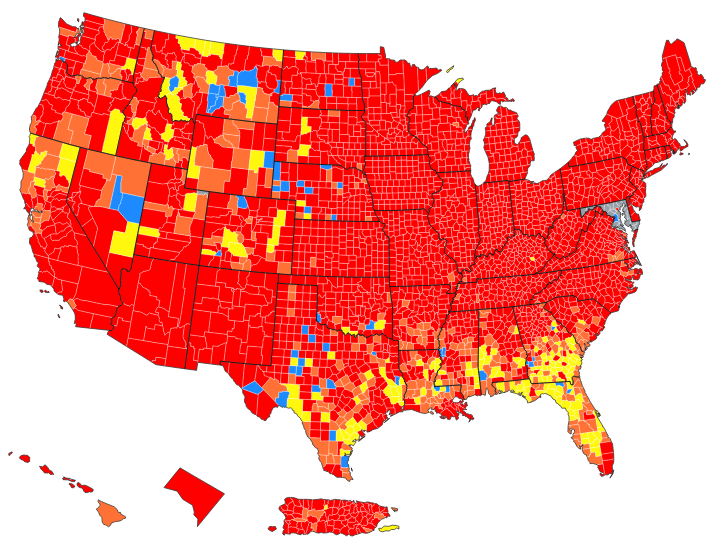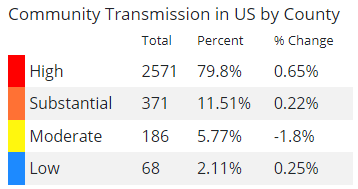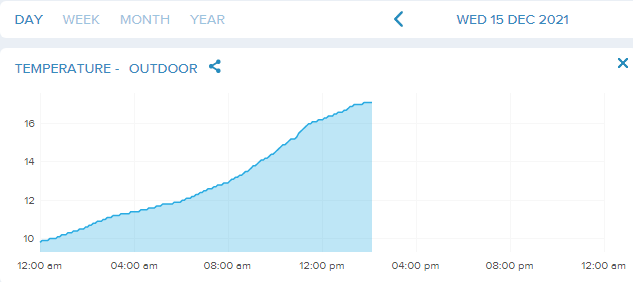Today is the second anniversary of the first reported Covid-19 case, a fact I had forgotten when I booked my booster shot two weeks ago. Since 2019, about 5.8 million people have died of it, 822,000 of them here in the US. And it has also befuddled peoples' senses of time.
NBC has a quiz to see if you remember when things happened in the last two years. I got 28, which embarrasses me. I really did forget all about Kanye West's divorce and Alex Trebek's death.
Let's hope that next year is 2,022, and not 2020 II.
SARS-Cov-2-omicron continues its march through the world, aided in part by a lack of tests that could detect and mitigate Covid infections early on. The Times reports that a Texas man died of the omicron variant despite his fantastical belief that a previous Covid infection rendered him immune. One would hope this would cure the metastasizing delusions of "herd immunity" incubated within the thick skulls and vulcanized brains of the voluntarily unvaccinated, but no, we live in 'Murica.
Meanwhile, Omicron looks more and more like a mild but super-contagious virus that probably won't send vaccinated people to the hospital. And the Walter Reed Army Research Institute quietly announced yesterday that they have developed a vaccine that targets all SARS viruses, not just Cov-2. So for people who have either the sense or the compassion to get vaccinated (and boosted), Covid-19 looks well on its way to becoming just another coronavirus, like the common cold.
Don't celebrate victory just yet, though. In the war against Covid-19 we may have gotten to December 1944, but Germany hasn't surrendered. The UK announced 100,000 new Covid cases just yesterday, a new record, and here in the US we've passed 51 million cases and 805,000 deaths, on course to hit 2 million deaths by the lockdown's 2-year anniversary in March.
This map does not make me happy:


About that WWII analogy: By December 1944, the Allies knew they would win eventually. But people living through the war had no idea how long it would continue. Even if they had known, at that point war would continue in Europe for six more months and in the Pacific for three more after that, killing millions more people. Imagine living in eastern France that winter, with the Allies fighting Germany for every hectare of land and you between them, starving. That's where we are today.
I think next summer will feel a lot like the summer of 1945. We'll have a lot to clean up, but we won't be dying as much. Then we can get back to eroding our democracy one congressional district at a time.
Update, 14:15 CST: The Atlantic's Yascha Mounk has similar thoughts.
I just started Sprint 52 in my day job, after working right up to the last possible minute yesterday to (unsuccessfully) finish one more story before ending Sprint 51. Then I went to a 3-hour movie that you absolutely must see.
Consequently a few things have backed up over at Inner Drive Technology World Headquarters.
Before I get into that, take a look at this:

That 17.1°C reading at IDTWHQ comes in a shade lower than the official reading at O'Hare of 17.8°, which ties the record high maximum set in 1971. The forecast says it'll hang out here for a few hours before gale-force winds drive the temperature down to more seasonal levels overnight. I've even opened a few windows.
So what else is new?
So what really is new?
But Sprint 52 at my office, that's incredibly new, and I must go back to it.
Messages for you, sir:
I will now go hug my dog, who set a record yesterday for staying home alone (8 hours, 20 minutes) without watering my carpets.
Just two of note. First, on this day 21 years ago, Al Gore conceded the 2000 election to George W Bush. Good thing that made almost no difference at all in world events.
Another anniversary is the one that happens every January 1st to works of art created a certain point in the past. A whole bunch of books, films, and musical compositions pass into the public domain as their copyrights expire, including:
- The Sun Also Rises and Winnie-the-Pooh, both published in 1926;
- The works of Louis Armstrong and Jim Morrison, who died in 1971 (except in the U.S.); and
- All musical recordings made before January 1, 1923.
Have fun adapting!
We're all set to perform Handel's Messiah tomorrow and Sunday, which got noticed by both the local news service and local TV station. Otherwise, the week just keeps getting odder:
And to cap all that off, the National Weather Service has announced a Hazardous Weather Outlook for tonight that includes...tornados? I hope the weather gets better before our performance.
Just a few:
And finally, atheist sci-fi author John Scalzi...bought a church?
I'm looking ahead to two long rehearsals, three performances, and squeezing into my tuxedo, all while the temperature drops over the next six hours to a predicted -9°C. I conclude from these facts that it's the beginning of winter.
I also just spent the last hour trying to get Visual Studio to log into the correct Azure subscription. So instead of reading these things at lunch, I had to let them pile up:
And now, back to the mines.
LTU history professor Andrew C McKevitt explains how gun capitalism fuels our gun crisis, not "ghost guns" (or "Saturday Night Specials" or mail-order guns or...):
Ghost guns are the latest iteration of this variety of moral panic, which distracts from and obscures the most direct source of the gun violence that plagues us: American gun capitalism, with its largely unrestricted production, distribution, marketing and sale of civilian firearms unequaled anywhere in the world. That system has placed a staggering 400 million guns in private hands in the United States, virtually all of them acquired through legal commerce — including the common firearm used in the Oxford High School shooting, which was purchased on Black Friday by the suspect’s father.
Moral panics over niche firearms like ghost guns enable Americans to imagine we are addressing an intractable problem. But by portraying the gun issue as an ethical one — delineating virtuous and unvirtuous uses and users of guns — gun panics ignore the economics at the heart of the problem and contribute to worse social outcomes, like greater criminalization, while failing to stem gun violence.
For seven decades, gun panics have shaped gun control politics and policy, resulting in a discussion driven by distinctions between virtuous and unvirtuous gun use. Such a dichotomy obscures the fundamental reality of gun life in America: Gun capitalism has put more than 400 million guns in Americans’ hands.
Gun panics operate on the specter of random violent crime, which has never represented the majority of gun deaths; Americans were and are much more likely to suffer gun violence at their own hands or those of people they know.
Along the same lines, journalist and retired politician David Pepper calls out broken state legislatures, such as Michigan's, that thwart the will of clear majorities of voters who favor stronger firearms regulation.
First, continuing the thread from this morning, (Republican) columnist Jennifer Rubin neatly sums up how the Republican justices on the Supreme Court seem poised to undo Republican Party gains by over-reaching:
We are, in short, on the verge of a constitutional and political tsunami. What was settled, predictable law on which millions of people relied will likely be tossed aside. The blowback likely will be ferocious. It may not be what Republicans intended. But it is coming.
Next up, Washington Post sports columnist Barry Svrluga argues that the Major League Baseball labor dispute and the lockout announced this morning will do nothing to prevent baseball from continuing its fade into irrelevance:
What can’t happen as MLB and the players’ union negotiate, though, is the actual game they stage being forgotten. Whatever the flaws in its salary structure and the dispersal of revenue, there’s money to go around. ... What should matter more than the money, then, has to be the game itself. The game itself is wounded.
Finally, today is the 20th anniversary of Enron filing for bankruptcy. In honor of that history, I give you the Deodorant Building Enron Headquarters in downtown Houston as it appeared in June 2001:

Sure Happy It's Thursday!